Japan-China Relations
Prime Minister Abe Visits China
October 26, 2018
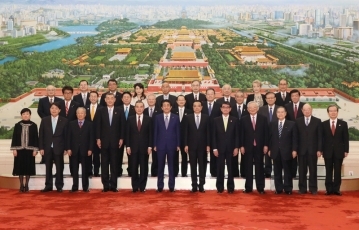 Commemorative photograph session with those who have close ties to the conclusion of the Treaty of Peace and Friendship between Japan and China
Commemorative photograph session with those who have close ties to the conclusion of the Treaty of Peace and Friendship between Japan and China
Photo: Cabinet Public Relations Office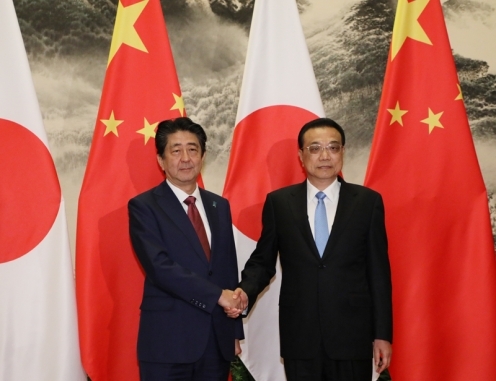 Japan-China Summit Meeting with the Premier of China
Japan-China Summit Meeting with the Premier of China
Photo: Cabinet Public Relations Office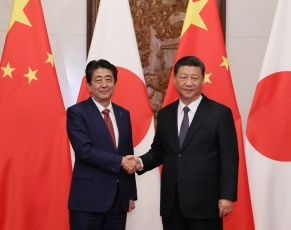 Japan-China Summit Meeting with the President of China
Japan-China Summit Meeting with the President of China
Photo: Cabinet Public Relations Office
- 1 Main Schedule
- 2 Overview of Japan-China Summit Meeting and Other Meetings
- 3 Other Events
- 4 Fact Sheet : Prime Minister Abe’s visit to China
1 Main Schedule
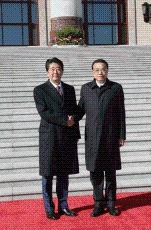 Photo: Cabinet Public Relations Office
Photo: Cabinet Public Relations Office
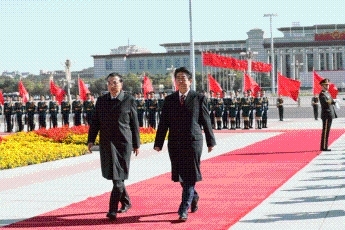 Photo: Cabinet Public Relations Office
Photo: Cabinet Public Relations Office
October 25
Afternoon
- Reception for the 40th anniversary of the Treaty of Peace and Friendship between Japan and China
Evening
- Small group dinner hosted by Premier Li Keqiang
October 26
Morning
- Meeting with Chairman Li Zhanshu of the National People's Congress Standing Committee
- Welcome Ceremony
- Japan-China Summit Meeting with Premier Li Keqiang
- Signing Ceremony and Joint Press Announcement
- Forum on Third Country Business Cooperation
Lunch
- Lunch hosted by Premier Li Keqiang
Afternoon
- Exchange with students at Peking University
- Japan-China Summit Meeting with President Xi Jinping
- Dinner hosted by President Xi Jinping and Mrs. Xi
2 Overview of Japan-China Summit Meeting and Other Meetings
(1) Meeting with Chairman Li Zhanshu of the National People’s Congress Standing Committee (Morning of October 26)
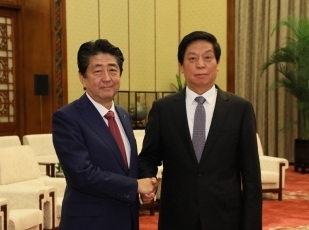 Photo: Cabinet Public Relations Office
Photo: Cabinet Public Relations Office
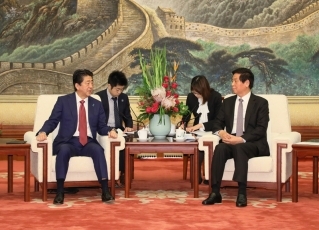 Photo: Cabinet Public Relations Office
Photo: Cabinet Public Relations Office
- At the beginning, Chairman Li stated that this year is the 40th anniversary of the conclusion of the Treaty of Peace and Friendship between Japan and China and marks a milestone for carrying on the past and linking it to the future. Through the efforts of both sides, the Japan-China relationship has gotten back on to a normal track and is heading in a positive direction. This fortunate trend should be cherished.
- For further improving the Japan-China relationship, the Chairman stated that the two countries should uphold the principles of peaceful co-existence and perpetual friendship enshrined in the Treaty of Peace and Friendship between Japan and China, as well as promote cultural exchanges including film and music that form the basis of people-to-people exchanges.
- In response, Prime Minister Abe, noting the recent meeting of the Japan-China Ruling Party Exchange Council held in Japan, stated that exchanges between the parliaments and political parties of Japan and China are an important pillar supporting the current trend of improving and deepening Japan-China relationship, and that he will continue to commit to further deepen the Japan-China relationship with the cooperation of Chairman Li.
- Prime Minister Abe conveyed greetings from Mr. Tadamori Oshima, Speaker of the House of Representatives, who visited China and met with Chairman Li in July, and once again invited Chairman Li to Japan. Chairman Li responded that exchanges between legislatures are an important component of the Japan-China relationship, that during their meeting he and Speaker Oshima reached to consensus to expand exchanges in all directions, that he would like to visit Japan when there is an opportunity, and that he appreciates the invitation from Speaker Oshima.
(2) Meeting with Premier Li Keqiang (Morning of October 26)
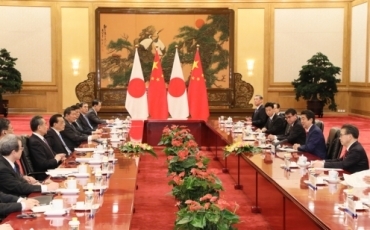 Japan-China Summit Meeting with the Premier of China
Japan-China Summit Meeting with the Premier of China
Photo: Cabinet Public Relations Office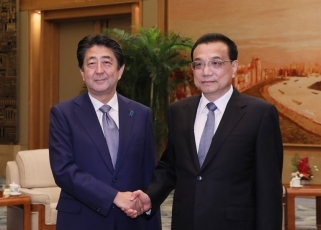 Prime Minister meeting with the Premier of China1
Prime Minister meeting with the Premier of China1
Photo: Cabinet Public Relations Office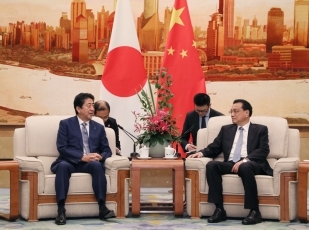 Prime Minister meeting with the Premier of China2
Prime Minister meeting with the Premier of China2
Photo: Cabinet Public Relations Office
High-level exchanges and other matters
- Prime Minister Abe stated that he hopes his visit to China will lead to the next step, which is President Xi Jinping's subsequent visit to Japan, to which Premier Li responded affirmatively. In addition, Premier Li invited Prime Minister Abe to attend the Japan-China-ROK Trilateral Summit to be held in China next year. Prime Minister Abe expressed his intention to return to China for the Summit.
- The leaders shared the view that it is vital to strengthen strategic communications between Japan and China in order to elevate the bilateral relationship to a new stage. It was decided that dialogues and exchanges between their foreign ministries would be deepened in a wide range of fields.
Economic cooperation
- Regarding business cooperation in third countries, the leaders welcomed the holding of the meeting of the Committee for the Promotion of Japan-China Business Cooperation in Third Countries last month and the meeting of the Japan-China Forum on Third Country Business Cooperation on this day, in accordance with the decision upon Premier Li's visit to Japan in May 2018, as well as the exchange of 52 memorandums of cooperation. The leaders also shared the view on newly establishing the Japan-China Innovation and Cooperation Dialogue to discuss cooperation in the areas of innovation and intellectual property rights.
- In the area of finance, the leaders welcomed the outcomes, including: (1) the designation of Renminbi (RMB) Clearing Bank; (2) the conclusion and entry into force of a yen/yuan currency swap agreement (note: an agreement to supply the currencies of Japan and China to their financial institutions that have currency shortages); and (3) the promotion of Securities Market Cooperation between Japan and China.
- Regarding the issue of import restrictions on foods produced in Japan, Prime Minister Abe once again requested the lifting of the restrictions as early as possible. China expressed that it would proactively consider relaxing the import restrictions on the basis of scientific evaluation. Japan appreciated China's intention, and the two sides shared the view that they would continue to seek to resolve their remaining issues as early as possible. Prime Minister Abe expressed expectation for the increase in of rice exports to China.
- The leaders shared the view that they would advance negotiations on an intergovernmental memorandum to develop an environment for the provision of giant pandas.
- The leaders confirmed that both sides will cooperate towards the early entry into force of the Japan-China Social Security Agreement, and welcomed progress in cooperation in areas such as long-term care and facilitation of customs clearance.
- The leaders shared the view that they would aim for the swift conclusion of the Regional Comprehensive Economic Partnership Agreement (RCEP) and the acceleration of negotiations on a Japan-China-ROK Free Trade Agreement (FTA). Furthermore, the leaders shared the view on promoting reforms of the World Trade Organization (WTO).
Cooperation in place of Japan's ODA for China
- Prime Minister Abe stated that China's "reform and opening-up" policy, which marks its 40th anniversary this year, has played a significant role for both Japan and China, and expressed expectation that it would play a deeper role going forward. On this basis, Prime Minister Abe conveyed that the Government of Japan has decided to end the adoption of all new official development assistance (ODA) to China as of this fiscal year. The leaders shared the view that Japan and China would coordinate towards the holding of dialogues and personnel exchanges in the area of development cooperation as bilateral cooperation at a new stage.
- The leaders shared the view that the two countries would take the opportunity of next year's Osaka G20 Summit and deepen cooperation on global issues, including the Sustainable Development Goals (SDGs), climate change, health, and marine plastic waste. In this context, Premier Li stated that China will cooperate towards the successful holding of the Osaka G20 Summit.
People-to-people exchanges and cooperation in consular affairs
- From the perspective of forging mutual trust and understanding between the people of Japan and China, the leaders shared the view that it is necessary to further expand two-way people-to-people exchanges, especially exchanges between the young generation and rural cities.
- Therefore, the two countries concurred to designate next year as a "Japan-China Youth Exchange Promotion Year" and further facilitate exchanges of 30,000 students from Japan and China in the next five years (note: Japan will consider utilizing existing frameworks, such as the Japan-China Greening Exchange Fund). In addition, the countries shared the view that they should make full use of the hosting of the Olympic and Paralympic Games in Tokyo and Beijing in 2020 and 2022, respectively.
Maritime security
- Regarding the issue of the East China Sea, Prime Minister Abe once again conveyed Japan's understanding of the issue based on the recognition that there will be no genuine improvement in the Japan-China relationship without stability in the East China Sea.
- On this basis, the leaders shared the view that it is important to make concrete progress in the area of maritime security, also from the standpoint of eliminating mutual distrust between the people of the two countries and establishing a constructive relationship. From this perspective, the leaders shared the view that by the end of this year, they would hold the first annual meeting of the Maritime and Aerial Communication Mechanism between the defense authorities of Japan and China concluded in May 2018. The leaders also welcomed the signing of the Japan-China Maritime Search and Rescue (SAR) Agreement.
- It is decided that the two countries would promote reciprocal visits by their defense ministers as well as exchanges and dialogues between their defense authorities, including reciprocal visits by military vessels, along with exchanges among maritime law enforcement agencies.
- Both Japan and China reaffirmed their complete adherence to the "2008 Agreement" regarding the development of resources in the East China Sea, and shared the view that they will further increase communication with the aim for an early resumption of negotiations to implement the agreement.
Regional and international affairs
- Regarding North Korea, the leaders reaffirmed the importance of fully implementing the relevant United Nations Security Council (UNSC) resolutions towards the denuclearization of the Korean Peninsula, a common goal shared by Japan and China. Prime Minister Abe once again explained Japan's position regarding the abductions issue, and Premier Li responded that he understands the issue and supports Japan.
- Premier Li explained the recent China-U.S. economic relationship. In response, Prime Minister Abe explained Japan's position of consistently regarding multilateral free trade arrangements including the WTO as important, and noted that it is essential for China to make further improvements on issues including subsidies and intellectual property rights.
Dinner and lunch
On the evening of October 25 and the afternoon of October 26, the leaders frankly exchanged views over a meal, in a friendly atmosphere, regarding the Japan-China relationship as well as regional and international affairs. The conversation between the leaders grew lively, especially over their responses to an aging society which is a common issue for both countries.
(3) Meeting with President Xi Jinping (Afternoon of October 26)
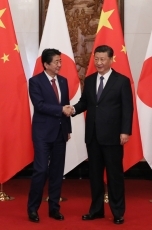 Photo: Cabinet Public Relations Office
Photo: Cabinet Public Relations Office
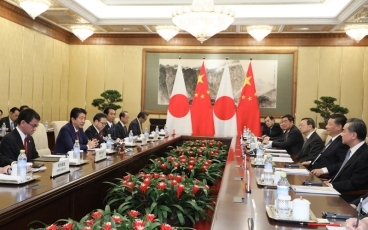 Photo: Cabinet Public Relations Office
Photo: Cabinet Public Relations Office
High-level-exchanges
- Prime Minister Abe once again stated that he would welcome President Xi's visit to Japan next year. President Xi expressed gratitude and responded that he will seriously consider it. In addition, Prime Minister Abe stated that he looked forward to returning to China for the Japan-China-ROK Trilateral Summit to be held in China next year.
- Regarding people-to-people exchanges, the leaders shared the view that the increase in Chinese visitors to Japan in recent years has contributed to the diversification of Chinese people's sentiments towards Japan. Building on this development, the leaders shared the view on supporting people-to-people exchanges focusing on the young generation, while also make use of the hosting of the Olympic and Paralympic Games in Tokyo and Beijing in 2020 and 2022, respectively.
Economic cooperation
- The leaders welcomed the many achievements made through Premier Li's visit to Japan in May 2018 and Prime Minister Abe's visit to China this time, including business cooperation in third countries, the establishment of a new Japan-China dialogue to discuss the area of innovation and intellectual property rights, and the deepening of financial cooperation.
- Prime Minister Abe once again requested the lifting of import restrictions on foods produced in Japan as early as possible.
Cooperation in place of ODA
In light of the termination of Japan's provision of new ODA to China, Prime Minister Abe stated that Japan would work shoulder to shoulder with China to pave an era for contributing to regional and global stability and prosperity, through dialogue and personnel exchanges in the area of development as well as cooperation on global issues. President Xi highly appreciated Japan's contribution through ODA and made positive remarks regarding such cooperation. In this context, the two sides shared the view that they would work together for the success of next year's Osaka G20 Summit.
Maritime security
Regarding the issue of the East China Sea, Prime Minister Abe reiterated Japan's understanding of the issue and requested improvement in the situation in the sea. The leaders shared the view that they would continue to strengthen communication and make efforts to avoid unintended consequences.
Regional and international affairs
- The leaders reaffirmed the importance of fully implementing the relevant UNSC resolutions towards the denuclearization of the Korean Peninsula, a common goal shared by Japan and China. Prime Minister Abe once again explained Japan's position regarding the abductions issue, and President Xi echoed Premier Li's response that he understands the issue and supports Japan.
- In view of the current China-U.S. relationship, the leaders exchanged open discussion regarding the relationship with the United States. Prime Minister Abe explained Japan's position of contributing to peace and prosperity of the Asia-Pacific region while making the alliance with the United States a cornerstone of its diplomacy and security.
- In this context, President Xi explained the recent China-U.S. economic relationship. In response, Prime Minister Abe explained Japan's position of consistently attaching importance to multilateral free trade arrangements including the WTO as important, and noted that it is essential for China to make further improvements on issues including subsidies and intellectual property rights.
Dinner
Prime Minister Abe and Mrs. Abe attended a dinner hosted by President Xi Jinping and Mrs. Xi. They engaged in a lively conversation in a very relaxed atmosphere regarding their respective domestic situations, sports exchanges, and other matters.
3 Other Events
(1) Reception for the 40th anniversary of the Treaty of Peace and Friendship between Japan and China, and other events (Afternoon of October 25)
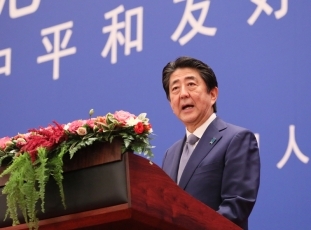 Prime Minister delivering an address at a reception to commemorate the 40th anniversary of the conclusion of the Treaty of Peace and Friendship between Japan and China1
Prime Minister delivering an address at a reception to commemorate the 40th anniversary of the conclusion of the Treaty of Peace and Friendship between Japan and China1
Photo: Cabinet Public Relations Office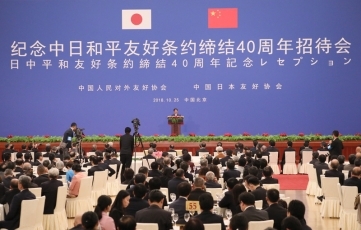 Prime Minister delivering an address at a reception to commemorate the 40th anniversary of the conclusion of the Treaty of Peace and Friendship between Japan and China2
Prime Minister delivering an address at a reception to commemorate the 40th anniversary of the conclusion of the Treaty of Peace and Friendship between Japan and China2
Photo: Cabinet Public Relations Office
- Prime Minister Abe and Premier Li Keqiang attended a reception celebrating the 40th anniversary of the Treaty of Peace and Friendship between Japan and China hosted by the Chinese People's Association for Friendship with Foreign Countries at the Great Hall of the People. The reception was attended by approximately 800 people from various circles of Japan and China.
- The leaders held a commemorative photograph session with those who were involved in the conclusion of the Treaty of Peace and Friendship between Japan and China. In addition, the leaders paid a visit to the "Photo Exhibition of Japan-China Economic Cooperation" and looked back on the course followed by Japan-China cooperation in the area of economics, including Japan's contribution to the Chinese economic reform through its ODA to China.
(2) Signing ceremony and joint press announcement (Morning of October 26)
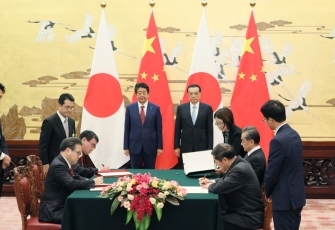 Photo: Cabinet Public Relations Office
Photo: Cabinet Public Relations Office
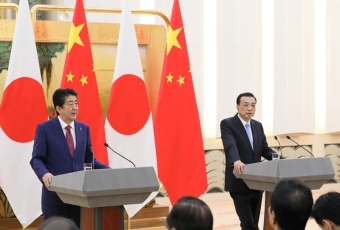 Photo: Cabinet Public Relations Office
Photo: Cabinet Public Relations Office
- Prime Minister Abe and Premier Li Keqiang held a joint press announcement immediately following their summit meeting.
- The leaders attended the signing of the following 12 international agreements and memorandums (note).
- Agreement on Cooperation for Maritime Search and Rescue between the Government of Japan and the Government of the People's Republic of China
- Memorandum on Enhancing Youth Exchanges between the Government of Japan and the Government of the People's Republic of China
- Memorandum on Drafting Annual Plan on Exchanges and Cooperation between the Ministry of Foreign Affairs of Japan and the Ministry of Foreign Affairs of the People's Republic of China
- Memorandum on the Establishment of the Japan-China Innovation and Cooperation Dialogue between the Ministry of Foreign Affairs and the Ministry of Economy, Trade and Industry of Japan and the National Development and Reform Commission and the Ministry of Commerce of the People's Republic of China
- Memorandum for Deepening Comprehensive Cooperation between the Ministry of Economy, Trade and Industry of Japan and the National Development and Reform Commission of the People's Republic of China
- Memorandum on Establishment of the "Japan-China Industry Ministers' Dialogue" between the Ministry of Economy, Trade and Industry of Japan and the Ministry of Industry and Information Technology of the People's Republic of China
- Memorandum of Understanding for the Promotion of Securities Market Cooperation between the Financial Services Agency of Japan and the China Securities Regulatory Commission of the People's Republic of China
- Agreement between the Customs Administration of Japan and the Customs Administration of the People's Republic of China on Mutual Recognition of the Authorized Economic Operator Program in Japan and the Enterprise Credit Management Program in the People's Republic of China
- 2018-2022 Action Plan for Cooperation on Elderly Long-term Care between the Ministry of Health, Labour and Welfare of Japan and the National Health Commission of the People's Republic of China
- Memorandum of Understanding on the Exchange and Cooperation between the Tokyo Organising Committee of the Olympic and Paralympic Games and the Beijing Organising Committee of the 2022 Olympic and Paralympic Winter Games
- Yen/Yuan Currency Swap Agreement
- Memorandum on Establishment of Renminbi Clearing Bank
Note: (k) and (l) above were signed in advance coinciding with Prime Minister Abe's visit to China.
(3) Forum on Third Country Business Cooperation (Afternoon of October 26)
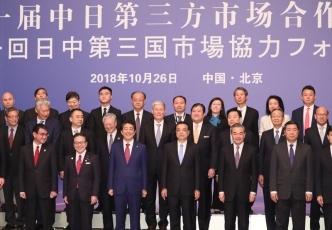 First Session of the China-Japan Third-Party Market Cooperation Working Mechanism
First Session of the China-Japan Third-Party Market Cooperation Working Mechanism
Photo: Cabinet Public Relations Office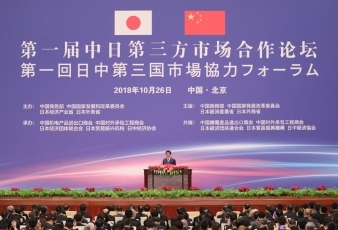 Prime Minister giving a speech at the First Session of the China-Japan Third-Party Market Cooperation Working Mechanism
Prime Minister giving a speech at the First Session of the China-Japan Third-Party Market Cooperation Working Mechanism
Photo: Cabinet Public Relations Office
(4) Exchange with students at Peking University (Afternoon of October 26)
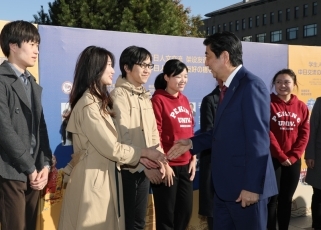 Photo: Cabinet Public Relations Office
Photo: Cabinet Public Relations Office
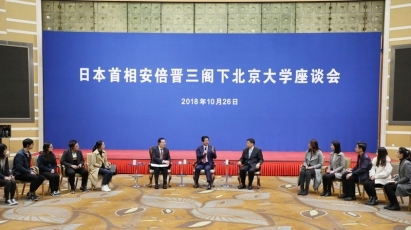 Photo: Cabinet Public Relations Office
Photo: Cabinet Public Relations Office
Prime Minister Abe visited Peking University and interacted with approximately 40 students from the university's Department of Japanese Language and Culture, School of Economics, School of International Studies, School of Life Sciences. During the question and answer session, discussion was held regarding topics such as the Japan-China Mutually Beneficial Relationship Based on Common Strategic Interests and its future prospects, the achievements of Abenomics and the world economy, new achievements made by innovation and Japan-China cooperation, the history of cultural exchanges, and next year's "Japan-China Youth Exchange Promotion Year."
4 Fact Sheet : Prime Minister Abe’s visit to China
(1)Fostering Mutual Political Trust
- Prime Minister Abe once again invited President Xi Jinping as well as Chairman Li Zhanshu of the Standing Committee of the National People's Congress to Japan; Japan and China will coordinate in order to realize these visits.
- The Chinese side expressed that it will cooperate towards the success of the G20 Osaka Summit to be held in June of next year. Japan welcomed China's support, and expressed that it will cooperate towards the success of the ASEAN Plus Three related meetings which China will co-chair.
- Both Japan and China welcomed the signing of the "Memorandum on Drafting Annual Plan on Exchanges and Cooperation between the Ministry of Foreign Affairs of Japan and the Ministry of Foreign Affairs of the People's Republic of China" as well as the announcement of next year's annual plan based on this memorandum in order to strengthen communication between the diplomatic agencies,.
(2)Cooperation and Confidence Building in Maritime and Security Affairs
- Both Japan and China reconfirmed their resolution to make the East China Sea a "Sea of Peace, Cooperation and Friendship."
- Both Japan and China reaffirmed their complete adherence to the "2008 Agreement" regarding the development of resources in the East China Sea, and shared the view that they will further increase communication with the aim for an early resumption of negotiations to implement the agreement.
- Both Japan and China reached a conclusion that they will hold the inaugural Annual and Experts Meeting based on the Maritime and Aerial Communication Mechanism between the defense authorities launched this June within this year.
- Both Japan and China welcomed that several tangible outcomes were achieved during the recent Japan-China Defense Ministers' Meeting which was held for the first time in three years, including to conduct high-level exchange among defense authorities, policy dialogue and exchanges among troops, exchanges in areas of disaster risk reduction, and the early opening of a hotline based on the Maritime and Aerial Communication Mechanism, as well as to commence discussion on mutual visits by the Chiefs of Staff of Japan and China, and to coordinate on the visit of the delegation of the Eastern Theater Command of the People's Liberation Army of China to Japan.
- Both Japan and China reached a consensus on beginning discussion of mutual visits at appropriate timings by the respective Defense Ministers as well as military vessels of the Self Defense Forces and the People's Liberation Army.
- Both Japan and China welcomed the signing of the Agreement between Japan and China on Maritime Search and Rescue.
- Both Japan and China reached a consensus on conducting high-level exchanges between the coast guard authorities of Japan and China including at multilateral fora as well as exchanges between the China Maritime Police Academy and Japan Coast Guard Academy, and welcomed the early visit to Japan by the cadets of the China Maritime Policy Academy.
- Both Japan and China concurred to hold the next meeting of the Japan-China High-Level Consultation on Maritime Affairs and the Japan-China Security Dialogue at the earliest time, and aim to achieve as much outcomes as possible in the area of maritime and security affairs.
(3)Promotion of Practical Cooperation in Economic Field
- Following the holding of the "Japan-China Committee for the Promotion of Japan-China Business Cooperation in Third Countries" and "Japan-China Forum on Third Country Business Cooperation", both Japan and China shared the view to promote business cooperation that would be in line with the international standards and would benefit the third country. They also welcomed that a total of 52 memoranda of cooperation were signed between private corporations and organizations from the two countries at the "Forum."
- Both Japan and China shared the view to establish a new Japan-China dialogue to discuss the area of innovation and intellectual properties, and welcomed the signing of a memorandum thereof.
- Building on the shared understanding at the Japan-China summit meeting in May, both Japan and China welcomed the designation of Renminbi Clearing Bank in Japan as well as the conclusion and entry into force of a yen/yuan currency swap agreement. They also shared the view to promptly realize the designation of Japanese banks as Renminbi Clearing Banks.
- Both Japan and China welcomed the conclusion of a memorandum of Understanding for the Promotion of Securities Markets Cooperation between Japan and China. They shared the view to strengthen multi-layered cooperation through coordination between the securities regulators and among stock exchanges, industry associations and relevant financial institutions. They also shared the view to strengthen practical cooperation concerning market monitoring and human resources development while holding, alternately, "Japan-China Securities Market Forum" as a platform for promoting concrete cooperation, as well as deepening feasibility studies to realize mutual listing of ETFs.
- Both Japan and China shared the view to allow authorized operators to use more prompt and simplified Customs procedures in order to ensure both safety and facilitation of Customs operations between Japan and China. In light of this, both sides welcomed the signing of the AEO (Authorized Economic Operator) Mutual Recognition Arrangement.
- Concerning the import restriction on Japanese food that have continued since 2011, the Chinese side expressed its intent to proactively consider the relaxation of such regulations based on scientific evaluation. The Japanese side appreciated it. Both sides shared the view to aim for an early resolution of the remaining issues. They also shared the recognition that the promotion of Japan-China food and agricultural trade will benefit the people of both countries.
- The Japanese side expressed its expectation for the expansion of rice exports to China.
- Both Japan and China welcomed that two ibises were transferred from China to Japan on October 17.
- The Japanese side hoped for the provision of giant pandas. Both sides shared the view to promptly negotiate for the signing of a government-to-government memorandum to develop the necessary environment and to support research on giant panda breeding.
- Both Japan and China shared the view to strengthen cooperation in the fields of medical and elderly long-term care.
- Both Japan and China welcomed that the Japan-China Social Security Agreement was signed on the occasion of Premier Li Keqiang's visit to Japan in May. They shared the view to continue their cooperation for an early entry into force of the agreement.
- Both Japan and China shared the view to aim for the swift conclusion of Regional Comprehensive Economic Partnership Agreement (RCEP) and for the acceleration of negotiations on Japan-China-ROK Free Trade Agreement (FTA). Both sides also shared the view to promote WTO reform.
(4)New Cooperation in place of Japan's ODA for China
- Both Japan and China concurred in seeking Japan-China cooperation at a new stage as equal partners. To this end, Japan will no longer adopt ODA project proposals for China in and after FY2018.
- Both Japan and China exchanged their views on proceeding with coordination between their agencies concerned to seek, as a new field of bilateral cooperation, dialogue and personnel exchange in the area of development cooperation as well as cooperative efforts to address global challenges such as Sustainable Development Goals (SDGs), climate change and the issue of maritime plastic waste.
(5)Promoting People-to-People Exchange / Cooperation in Consular Affairs
- Both Japan and China welcomed the signing of the "Memorandum on Enhancing Youth Exchange," and concurred to designate next year as a "Japan-China Youth Exchange Promotion Year" and further facilitate exchanges among the youth generation of both countries. From such standpoint, both Japan and China decided to promote youth exchange of 30,000 students in the next five years.
- The Japanese side announced further relaxation of visa requirements for university students and repeat tourists from China. The Chinese side expressed its welcome towards Japan's measures.
- Both Japan and China shared the view to continue to discuss tangible ways to further increase mutual visits among the people of Japan and China.
- Both Japan and China reached a conclusion to foster promotion of exchanges between the people of Japan and China, taking the opportunity of the 2020 Tokyo Olympic and Paralympic Games and the 2022 Beijing/Zhangjiakou Olympic and Paralympic Winter Games. Both Japan and China welcomed the signing of the Memorandum of Understanding on the exchange and cooperation between the Tokyo Organizing Committee of the Olympic and Paralympic Games and the Beijing Organizing Committee of the 2022 Olympic and Paralympic Winter Games.
- Both Japan and China shared the view to closely communicate between the two countries in order to promote tangible cooperation, following the Film Co-production Agreement between Japan and China which came into effect this May.
- Both Japan and China reached a conclusion to aim for an agreement in principle at the earliest possible time on the Treaty on Extradition and the Treaty on the Transfer of Sentenced Persons.
(6)Regional and Global Issues
Both Japan and China shared the view that the two countries will continue to communicate at every level and strengthen coordination regarding regional and global challenges that both countries have strong interests in, including the situation on North Korea. Furthermore, they reaffirmed to continue to cooperate towards the resolution of the abductions issue.


